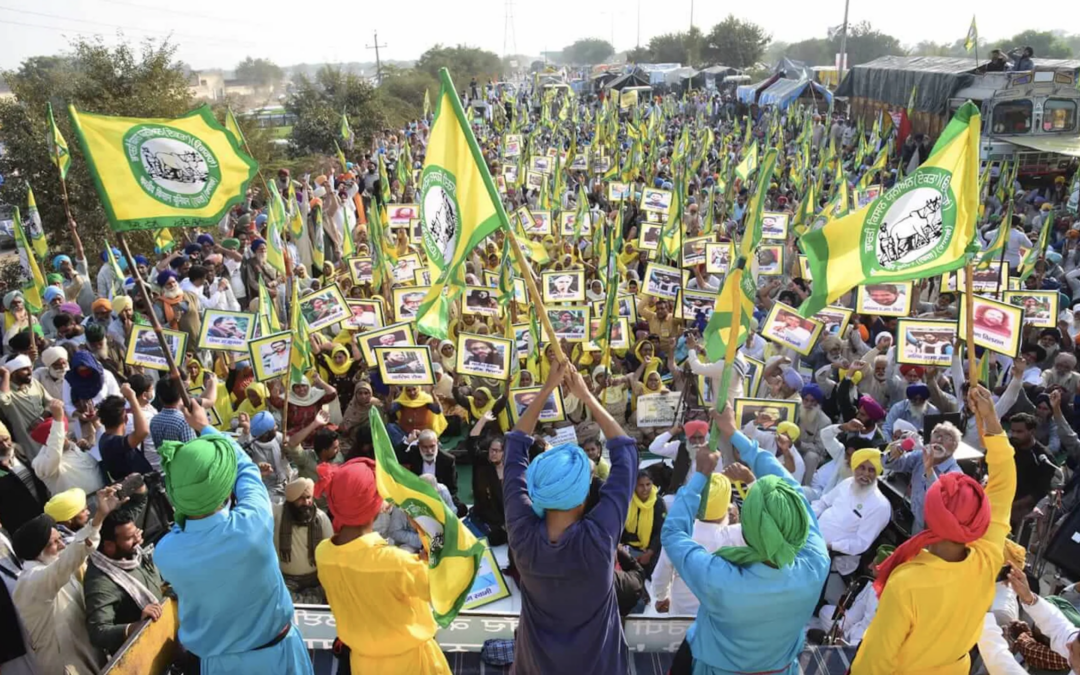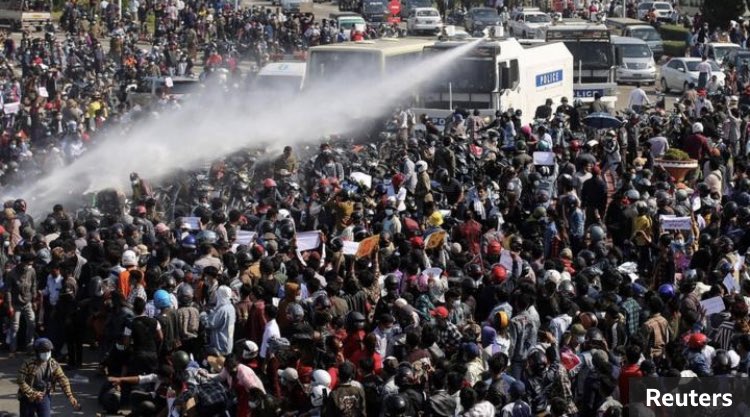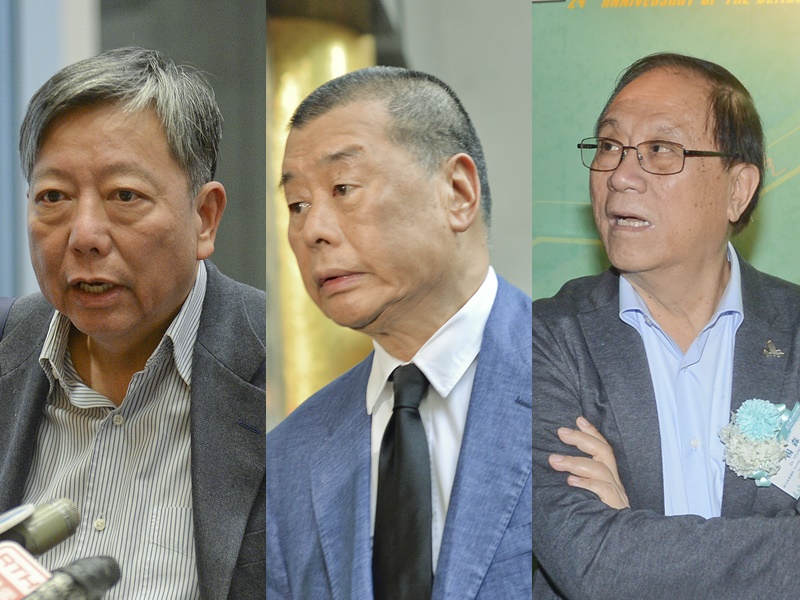
Feb 11, 2021 | News
The ICJ today condemned the unlawful repression of peaceful protests and urged the Indian authorities to respect the right to freedom of assembly of Indian farmers who have been demonstrating in Delhi since November 26, 2020 against newly promulgated agricultural laws.
Since early February 2021, police have used metal barricades, cement walls and iron nails to block the roads leading to Tikri, Singhu, Ghazipur, the three main borders where the farmers have assembled. They have done so to prevent any vehicles from these areas entering Delhi. The barricades have also served to deny male and female farmers and their families, including children, consistent access to water and sanitation facilities. The protests at these sites over the past two months are reported to have been peaceful.
Thousands of farmers from all over India, and most heavily from Punjab, Haryana and Uttar Pradesh, have demanded the repeal of a new set of agricultural laws, fearing that these will serve to eliminate government protections for crop prices and thereby impact their livelihoods.
Two journalists were detained and assaulted for reporting from the ground, while nine senior journalists have been threatened with criminal charges including sedition charges by the Indian Government. More than 125 persons, including farmers and also bystanders have reportedly been arrested largely in response to a violent clash that occurred on 26 January 2021. At least 21 farmers are reported to be currently missing.
“Rather than protecting the right to peaceful protest as required by law, the Indian authorities have cracked down on farmers in an arbitrary and aggressive manner, using unlawful force and preventing free movement as well as access to essential facilities”, said Ian Seiderman, ICJ’s Legal and Policy Director.
The Indian Supreme Court on 17 December 2020, upheld the right to protest of farmers calling it “part of a fundamental right” which can be exercised “subject to public order”. The Court has further said that “[t]here can certainly be no impediment in the exercise of such rights as long as it is non-violent and does not result in damage to the life and properties of other citizens and is in accordance with law.”
“The suppression of the right to peaceful assembly has become a pattern in India, as we saw in December 2019 and January 2020 with the mass arrests of students and human rights defenders who were protesting against the Citizenship Amendment Act,” said Seiderman.
The ICJ called on the responsible authorities to remove barricades around protest sites, enable access to water and sanitation facilities and to desist from further arbitrary arrests.
Background
The three contentious farm laws being the Farmers’ Produce Trade and Commerce (Promotion and Facilitation) Act, 2020, Farmers (Empowerment and Protection) Agreement on Price Assurance and Farm Services Act, 2020 and Essential Commodities (Amendment) Act, 2020 were brought in through executive ordinance without legislative consultation and adequate scrutiny and received presidential assent on 27 September 2020.
Farmer unions from Punjab, Haryana and Uttar Pradesh began to set up protest sites on the borders of Delhi on 26 November 2020. There have been a series of unsuccessful negotiations between the Ministry of Agriculture and Farmers Welfare and the farmer representatives. In response to the protests, the Indian Supreme Court on 12 January ordered the suspension of the “implementation of the three farm laws until further orders”. The Court set up a four-person expert committee to negotiate between farmers and the Government. However the committee’s efforts have become stalled.
On 26 January, India’s Republic Day, some tens of thousands of farmers drove into Delhi in tractors, with some protestors deviating from the sanctioned routes permitted by the Delhi Police. There were clashes with the police where one protestor was killed in the violence, and nearly 400 policemen were injured. Some protestors also entered the Red Fort, an historical monument, and hoisted the Sikh religious flag on a flagpole.
On 29 January, police and at least some private forces tried to forcibly disperse the protests on Ghazipur, Singhu and Tikri borders through stone pelting and baton charging. Farmer protestors allege that the some of those working with the police were associated with Rashtriya Swayamsevak Sangathan (RSS), the ideological outfit associated with the ruling party Bhartiya Janata Party.
On 6 February there was a three-hour blockade on state and national highways placed by farmers throughout large parts of India in protest against the agricultural laws, the government’s measures against the protestors and the reduction of budgetary allocation for farmers.
Freedom of assembly is protected under the International Covenant on Civil and Political Rights, to which India is a party.
Contact
Maitreyi Gupta, ICJ India Legal Adviser, t: +91 77 560 28369 e: maitreyi.gupta(a)icj.org

Feb 8, 2021 | News
The Myanmar military’s coup d’etat of 1 February is unconstitutional and fails to comply with basic rule of law principles, said the ICJ today.
“The Myanmar military’s actions violate even the flawed Constitution that the military itself imposed in 2008,” said Sam Zarifi, ICJ’s Secretary General. “The irregularities alleged by the military in the recent elections do not justify declaring a state of emergency and shattering the already weak rule of law in the country.”
The coup d’etat does not comply with the Constitution of the Republic of the Union of Myanmar 2008, which suffers from multiple shortcomings in basic respect for the rule of law and international human rights standards.
Article 417 of the Constitution requires the President to declare a state of emergency when there is a risk to the sovereignty of the country.
Article 418 requires the President to hand over all power to the Commander-in-Chief of the Army. Contrary to this provision, the state of emergency was declared by the Vice-President, after the military detained President Win Myint.
“The accountability of the military to the civilian authorities is a core rule of law principle”, said Sam Zarifi “Myanmar’s military leaders have turned this principle on its head by usurping total authority again.”
The ICJ is concerned that Myanmar’s Constitution provides for the possibility of suspending protections for a number of human rights, such as freedom of expression and association and the right to habeas corpus. Under international human rights law, derogations from certain rights are permissible only when strictly necessary to meet a specific threat to the life of the nation, conditions not met under the current emergency.
The right to habeas corpus is among those rights that may never be suspended. The writ of habeas corpus allows any person detained by any State agent, including during emergencies, to challenge the lawfulness of the detention.
“The right to test the lawfulness of any detention needs to be restored and the judiciary must be able to independently examine the legality of any arrests and detentions and order to release of those it finds are detained illegally” said Sam Zarifi.
Of particular concern to the ICJ is the near-total impunity provided to the military after the declaration of the State of Emergency, and the proliferation of arbitrary detention without recourse to legal review.
Article 432 of the Constitution effectively shields the military and security forces from any review of ’legitimate measures’ pursuant to the declaration of a state of emergency, which the ICJ notes also flies in the face of the rule of law.
“After the shock of the coup d’etat, we are now seeing brave lawyers and civil society activists trying to use peaceful means at their disposal to demand their rights,” Zarifi said. “This movement is not focused around an icon or even one party, but on the notion that the people of Myanmar should be able to government themselves and decide their future.”
Contact
Sam Zarifi, ICJ’s Secretary General, sam.zarifi(a)icj.org

Mar 4, 2020 | News
Following the arrest on 28 February of at least three persons, the ICJ has called on the Hong Kong authorities to drop criminal charges of taking part in an “unauthorized assembly” against them and to reform the Public Order Ordinance in compliance with international human rights obligations.
On 28 February, Hong Kong police arrested publisher Jimmy Lai, the founder of Next Media, which publishes the Apple Daily newspaper, and two pro-democracy activists, Lee Cheuk-yan, the vice-chairman of the Labour Party, and Yeung Sum, a former chairman of the Democracy Party, for taking part in a march banned by police on 31 August 2019. The Police prohibited the march on the stated grounds that the Civil Human Rights Front could not guarantee the march would be peaceful and orderly, shifting responsibility of maintaining order to the organizer.
“We are extremely concerned about the way in which the unauthorized assembly provisions of the Public Order Ordinance has been used to silence lawful expressions of political opinion since the Umbrella Movement of 2014,” said Frederick Rawski, ICJ’s Asia Pacific Director. “These most recent arrests, made for allegedly participating in a largely peaceful protest more than six months ago, are part of a troubling pattern of bringing legal action to harass activists involved in peaceful acts of protest.”
The arrests were made pursuant to the Hong Kong SAR Public Order Ordinance (Cap. 245) Section 17A(3)(a). Under the ‘unauthorized assembly’ provisions of the law, every person who, without lawful authority or reasonable excuse, knowingly takes or continues to take part in or forms or continues to form part of any such unauthorized assembly is guilty of an offence and can be sentenced up to five years imprisonment.
The authorities have wide discretion to prohibit public meetings, and prosecute those who are alleged take part in them. These overbroad provisions have been used to restrict the proper exercise of free assembly and association rights – including onerous requirements to obtain a “notice of no objection” from the government for even small gathering under a threat of a maximum five years imprisonment for violations.
“The ICJ calls upon the Hong Kong SAR government to take measures to protect the right to peaceful assembly and create an environment in which people can safely express diverse ideas and dissenting voices – consistent with international legal obligations,” said Rawski. “This includes ensuring that the law is not used to harass pro-democracy activists and human rights defenders.”
The ICJ underscores that any restrictions to the right of peaceful assembly must be narrowly drawn to be permissible under international law. Restrictions are not permissible unless they have been provided by law, and are necessary and proportionate to a legitimate purpose enumerated in article 21 of the ICCPR, such as public order. However, imposing criminal charge on people exercising their right of peaceful assembly who fail to comply with a procedural requirement, such as notification, unduly restricts freedom of peaceful assembly by adding unnecessary barriers to public gatherings. Furthermore, the sentencing guidelines of the Ordinance, which include the possibility of a peaceful participant of a public assembly being sentenced to five years in prison if the organizers fail to comply with the notification requirement, are extreme, disproportionate and open to abuse.
Hong Kong SAR, though not the rest of the PRC, is legally bound by the ICCPR. Article 21 of the ICCPR and Article 27 of the Basic Law in Hong Kong both recognize and protect the right of peaceful assembly. The UN Human Rights Committee, the supervisory body responsible for the ICCPR and other UN independent authorities, have repeatedly urged the authorities to ensure that the Public Order Ordinance is implemented in conformity with Hong Kong’s obligations under the ICCPR.
To download the full statement with additional information, click here.
See also: Hong Kong: ensure police do not use excessive force against protesters
https://www.icj.org/hong-kong-ensure-police-do-not-use-excessive-force-against-protesters/
Contact:
Frederick Rawski, ICJ’s Asia Pacific Regional Director, t: +66 2 619 84 77; e: frederick.rawski(a)icj.org
Boram Jang, ICJ Legal Adviser, Asia & the Pacific Programme, e: boram.jang(a)icj.org







